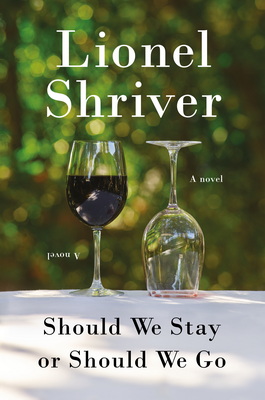Should We Stay or Should We Go, by Lionel Shriver
Reviewed by Michael Attard
The narrator introduces us to Kay and Cyril, an English couple in their early fifties. They have just returned home from the funeral of Kay’s father, who suffered from severe Alzheimer’s for many years. The opening mood of the novel is bleak with the dialogue including phrases such as “a grotesque waste of money” and “This dying by degrees, it cheats everyone.”
The author, Lionel Shriver, throughout the book has the couple engage in serious conversations reflecting well-thought-out opinions and insights, which adds a great deal to the enjoyment of the book. The professional couple appears to be in full control of their lives and to be contributing members of society. Yet, the blaring question between them is, “What will happen to us?”
By page fourteen – so I am not giving much away – Kay and Cyril, of sound mind, agree that in order to ensure that they do not become a burden to anyone, as well as preserve their own dignity – to commit suicide together on Kay’s 80th birthday.
Thirty years later, the fateful day arrives. Over those three decades, only occasionally had they discussed their pact. The author somewhat cleverly entwines Kay and Cyril’s interest in the Brexit debate into their arguably much more important situation. During Brexit, there were “Remainers” and “Leavers,” which was precisely analogous to their life-or-death quandary. And at one point, Brexit was delayed, so could they, too, delay? Kay thought that they might, but not Cyril. For some readers, this talk of Brexit may detract from the premise of the book.

This fateful day also falls in the middle of Covid-19. Kay realizes that with the cancellation of social engagements, she will not have some “good-byes” at all. And she says, “I still can’t get my head round what it means to be alive… much less what it means to die.” This leads to what Kay secretly calls “introducing a wild-card.” But once the card is played, it does not produce the expected outcome, and while the story seems to be over, it is only page 70.
What follows is ten different scenarios where either Kay or Cyril, sometimes in agreement, disagreement, or unknown to the other, change course and break the pact. Often their children or other parties become involved in the unforeseen consequences to the extent that life after 80 may resemble paradise or hell.
Even though the book’s subject is serious, the author has created light sections allowing the reader an occasional respite from the gloom and offering an encouragement to read on. Some readers, myself included, may feel that the author goes overboard in the chapter where Kay and Cyril pass on the suicide to be rewarded with a wonder drug whereby not only is their youth restored, but they can live forever. However, the author, never completely abandoning the serious vein in which the novel is written, offers through the characters the suggestion that the taking away of the inevitability of nature would lead to a psychic crisis of teleological proportions where people would fail to see a personal purpose.
I found chapter seven to be the dreariest and most depressing. I am sure that this is because I recognized that the conditions described in the institution where Kay and Cyril find themselves locked up were perhaps, if at all, only slightly exaggerated. This chapter serves as an ominous warning to anyone considering long-term care for a parent. The onset of senile dementia with the loss of memory and cognitive function does not necessarily mean that the older person has lost their personal sense of dignity. Yet, in this chapter, the home operates on the patronizing premise that their role is to provide basic care for human shells.
In a frightful scenario, Cyril loses his nerve and Kay commits suicide on her own. The daughter concludes that her father murdered her mother and subsequently feels that no amount of suffering is too much for him to bear.
Cryogenics does not go well either. With Cyril and Kay coming back light years in the future, I think the author detracts from her serious consideration of voluntary suicide by creating an almost comical and yet unamusing world.
The focus of a couple of chapters is on the future world condition. If we can look forward to longevity without illness or pain, then life will be worth living. But if the future portends a world gone insane or a subsistence at the poverty level, then perhaps it might be better to go at a time of our own choosing.
Other than the first two chapters, the other eleven could come in any order. There is no progression to a logical or even reasonable conclusion, and this probably reflects the author’s position. No one ever chose to be born, and the vast majority of humans do not choose to die. However, in the modern world where it is easier than ever to prolong life, the question of when to die has become meaningful. But this will invariably entail the question, at what cost?
I think that Ms. Shriver has taken both a realistic and fanciful view of a question for our modern age. She has neither judged nor suggested. Rather, she has proposed that on an individual and societal level, we acknowledge the dignity of both life and death.
The Reviewer
Michael Attard is a Canadian who has lived in Gwangju since 2004. Though officially retired, he still teaches a few private English classes. He enjoys reading all kinds of books and writes for fun. When the weather is nice, you may find him on a hiking trail.







